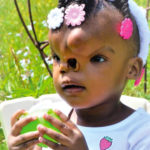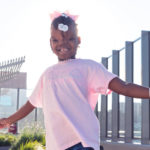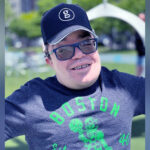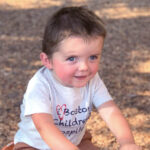Care for a prince: One family’s inspiring journey for encephalocele repair
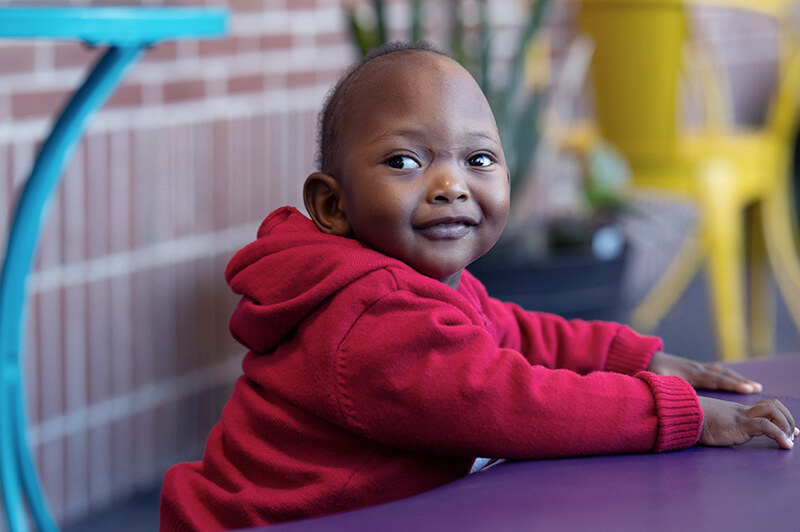
To hear Peter and Eunice of Kenya tell the story of their son, Prince, is to hear about the power of hope, the best of humanity, and the interconnectivity that makes the world a small place after all.
Hope in the hopeless
In March 2022, Eunice was about five months into her pregnancy when a gender-reveal ultrasound showed ventriculomegaly, a condition in which a fetus’s brain ventricles appear larger than normal. Additional scans then revealed an encephalocele, a rare fetal anomaly in which brain tissue protrudes through an opening in the skull. Doctors told Peter and Eunice that their baby would not survive. When Prince arrived two months later, the family was discharged from the hospital to care for Prince on their own. Determined to find help for their son, Peter and Eunice turned to the internet.
“It’s been our savior,” Peter says.
Online, they found support groups, research, and videos about encephalocele treatment, many of which featured the Cleft and Craniofacial Center at Boston Children’s Hospital. Peter was amazed by the level of care and expertise the Boston Children’s team demonstrated.
“I knew there was no way we could get that kind of expertise in Kenya,” Peter says. “Watching the videos gave me the courage to email Boston Children’s.”
He sent his note — his “cry for help,” as he calls it — around midnight one summer night and heard back from Samantha Hall, Cleft and Craniofacial Center coordinator, within days.
Cries for help answered
Peter was astonished that Samantha responded so quickly and that Boston Children’s would evaluate Prince’s case. But for the evaluation, Peter and Eunice needed to gather records of Prince’s previous care — most of which didn’t exist — and obtain additional imagery, including an MRI to get detailed pictures of Prince’s brain and identify the extent of the encephalocele.
As Peter and Eunice worked to get Prince the needed imaging, they were put in touch with Todd DiSalvo, global patient services senior case coordinator, to navigate the next steps on approval to come to Boston Children’s. Still, Peter and Eunice had to get from Kenya to Boston.
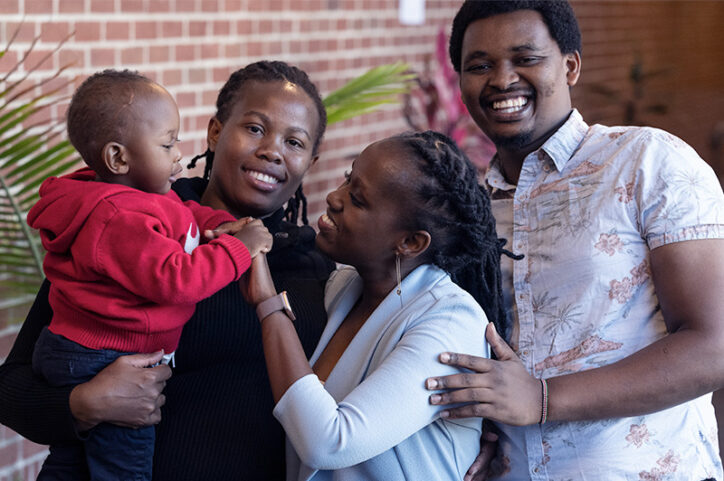
In addition to the daunting prospect of traveling across the world, they also needed to pay for the trip. They turned to their faith group, which answered tenfold.
Not only did Peter and Eunice’s faith group help raise enough money for the international flight, but they also connected them with Kenyan families living in the Boston area who volunteered to host during Prince’s care. One such volunteer was Ruth, a young professional who had a personal connection to Boston Children’s.
Careful, collaborative surgical care
Prince, Peter, and Eunice arrived in Boston last summer. Dr. John Meara, plastic surgeon-in-chief, and Dr. Mark Proctor, neurosurgeon-in-chief, led Prince’s care at Boston Children’s.
Treatment for encephaloceles requires surgery; the specific surgical approach depends on the size and location of the encephalocele and any possible complications. For Prince, Dr. Proctor removed the exposed brain tissue and closed the hole in Prince’s skull in a way that ensured proper neurological function. Dr. Meara then repaired Prince’s skull and eye socket area to create a more balanced face. Prince’s encephalocele repair was straightforward and uncomplicated for Dr. Proctor, Dr. Meara, and their teams, and both surgeons were pleased with the result.
“It seems like he’s going to do very well,” Dr. Meara says.
To say Peter and Eunice are also pleased would be an understatement. Today, at home in Kenya, Prince is a happy and curious 1-and-a-half-year-old who runs everywhere and loves to dance. “This journey has been made beautiful by the outcome,” says Peter. “I’d love to say ‘thank you’ to Dr. Meara and Dr. Proctor because there are no other words I can use to describe how I feel. How can I describe our gratitude? It’s unimaginable.”
Learn more about the Cleft and Craniofacial Center at Boston Children’s Hospital and the Global Services program.
Related Posts :
-

A rare diagnosis: Zoey's new smile
Zoey Alford’s favorite TV show is Vampirina, the animated tale of a little blue-skinned vampire trying to fit in ...
-

New year, new face, same spirit: Zoey’s journey with encephalocele and cleft lip care
Seven-year-old Zoey loves school, her friends, and everything unicorn. She’s outgoing and happy and has an eye for looking ...
-

Decades in the making: JR’s journey with craniofacial care
Last fall, JR Foley posted on Facebook to thank members of the Craniofacial Program at Boston Children’s Hospital for ...
-

There's no stopping Jack: His journey with craniosynostosis
Jack is almost 2 years old and loves to swim, chase his older sister around the house, and just bring lots ...


